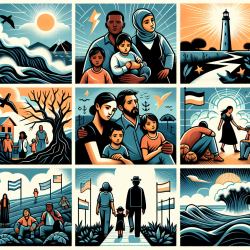The migration journey is often fraught with challenges, especially for refugees, asylum-seekers, and undocumented migrants. These individuals face unique hardships as they navigate parenthood in foreign lands. A recent synthesis of qualitative literature by Merry et al. (2017) sheds light on the experiences of these migrant parents and offers valuable insights for practitioners working with this population.
Understanding the Themes
The research identifies three integrative themes that shape the parenthood experiences of migrants:
- Experiencing Hardship and Loss: Migrant parents often deal with precarious migration statuses and past traumas, which contribute to feelings of loss and hardship. They face challenges such as unemployment, discrimination, and the fear of deportation.
- Building Resilience and Strength: Despite adversities, migrant parents exhibit resilience by bridging language barriers and cultural norms. They draw strength from community support, faith, and a focus on their children's futures.
- Living Transnationally: Many migrant families maintain ties with their home countries, which adds complexity to their experiences but also provides resources and support.
Practical Applications for Practitioners
Practitioners can enhance their skills by integrating these insights into their work:
- Cultural Sensitivity: Understand the cultural backgrounds of migrant families and respect their traditions while providing support.
- Transnational Perspective: Acknowledge the ongoing connections migrant families have with their home countries. This perspective can help in designing programs that address both local integration and transnational ties.
- Support Systems: Encourage the development of community networks that can provide emotional and practical support to migrant parents.
- Psycho-social Support: Offer mental health services that address past traumas and current stressors related to migration.
- Linguistic Assistance: Facilitate language learning opportunities for both parents and children to ease integration challenges.
The Need for Further Research
The study highlights gaps in research, particularly concerning fathers, extended family members, and asylum-seekers. More studies are needed in low- and middle-income countries to understand the global context of these experiences better. Practitioners are encouraged to engage in research that explores these areas further.
A transnational lens is crucial for developing more relevant policies and practices that support migrant families effectively. By doing so, practitioners can help bridge cultural divides and foster environments where migrant families can thrive despite the challenges they face.










